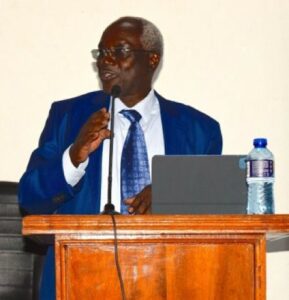Pharmacy and Poisons Board CEO Commends Pharmacists for Leadership in Strengthening Kenya’s Pharmaceutical Industry

Nairobi, Kenya: On May 30, 2025, during the University of Nairobi School of Pharmacy’s 50th anniversary symposium, Pharmacy and Poisons Board (PPB) CEO Dr. F. M. Siyoi praised pharmacists for their critical role in advancing Kenya’s self-reliance in health products and technologies through leadership in local pharmaceutical manufacturing.
Dr. Siyoi credited the rise of Good Manufacturing Practice (GMP)-compliant facilities to the profession’s sustained commitment to pharmaceutical excellence. “This leadership has strengthened Kenya’s pharmaceutical supply chain, enhanced medicine security, and positioned the country as a regional manufacturing hub,” he said.
The symposium, themed “Celebrating 50 Years of Excellence in Pharmacy Training and Practice – Transforming Healthcare, Shaping the Future,” gathered academia, regulators, industry stakeholders, and students to mark five decades of impact in pharmacy education, research, and practice.
Dr. Siyoi acknowledged the University of Nairobi School of Pharmacy as a key driver in shaping Kenya’s pharmaceutical landscape, noting that many alumni now hold senior regulatory and technical roles at PPB and across the public health sector.
He highlighted PPB’s regulatory milestones, including professional registration, product evaluation, clinical trial oversight, and pharmacovigilance. He noted that partnerships between PPB and the pharmacy profession have fostered incentives such as expedited product registration, facilitated market access, and tax waivers to boost local manufacturing.
“These collaborations are strategic tools for improving access to quality-assured medicines and building resilient health systems,” Dr. Siyoi remarked.
Further, he introduced the Integrated Regulatory Management System (IRMS), a digital platform designed to streamline licensing, product authorization, professional registration, pharmacovigilance, and inspections. “This innovation enables stakeholders to engage with regulators via a secure, centralized portal—cutting paperwork, enhancing transparency, and improving turnaround times,” he explained.
Looking forward, Dr. Siyoi called for greater investment in competency-based training, interdisciplinary research, and development of a future-ready regulatory workforce, urging the University of Nairobi to lead this next phase. He reaffirmed PPB’s commitment to ongoing collaboration in support of Kenya’s national development objectives.


